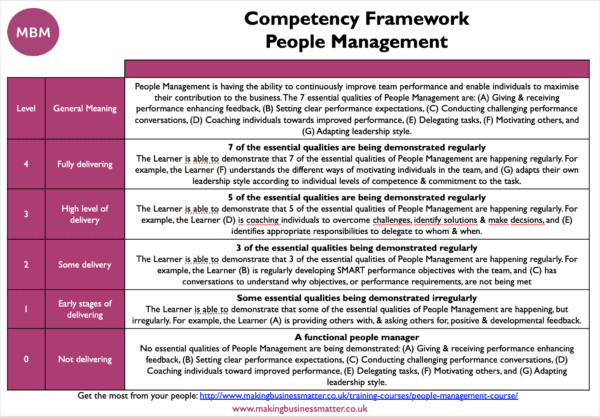Management Training Courses
As management trainers, we are often asked what is the best course to improve people management skills. In this article, you can find out all about management training courses. In addition, you will find answers to the most common questions, including which is the best training course for managers.
1. What Are the Best Management Courses?
According to CareerAddict the best 8 training management courses in the world are:
- Master of Business Administration (MBA).
- Project Management Professional (PMP).
- Chartered Management Institute (CMI).
- Institute of Leadership and Management (ILM).
- Certified Management Consultant (CMC).
- Master in Management (MIM).
- Commissioning Course – Royal Military Academy, Sandhurst (RMAS).
- Internal Company Training Programmes.

We understand qualifications are important and an MBA from Harvard is not to be sniffed at.
Here at MBM, the last 18 years of working as management trainers have taught us that any training course is only as good as the behaviours it changes. This means that by all means take a course with the big names, but just remember that when you are leading a team would you rather have a certificate/qualification, or know how to do it, have practised it, and be able to easily show those behaviours? If it’s the latter, take a look at our managers’ training course.
2. What Kind of Training/Qualifications Do Managers Need?
A degree is often required in order to become a manager of people and have a level of experience. Most people do a job and show that they can do it successfully, and then subsequently gain promotion. The risk is that a person who is competent in doing their job is not necessarily competent at managing people. This is known as the ‘Peter Principle‘.
Wikipedia defines this as:
The Peter Principle is a concept in management developed by Laurence J. Peter. It observes that people in a hierarchy rise to their “level of incompetence”. Employees gain promotions based on their success in previous jobs until they reach a level at which they are no longer competent. This is due to the fact that skills in one job do not necessarily translate to another. The book, The Peter Principle (William Morrow and Company, 1969) by Dr Peter and Raymond Hull explains the concept in great detail.
Managers that have recently gained a promotion need to develop requisite skills through training to manage people. Not left to sink or swim.
3. What Are the 3 Types of Management?
People that manage people generally fall into one of three management styles; Autocratic, democratic and laissez-faire. Each style has its advantages and disadvantages.
Autocratic is a top-down approach where communication is one-way. Do this and do that. This style tends to be seen in the negative. For example, Napoleon, Hitler and Margaret Thatcher all adopted this style. The advantage of this style is that it can get a group of people to follow orders towards the leader’s goal.

Democratic is a management style where people have a say and can vote. Their opinion is heard. Abraham Lincoln was thought to be a Democratic leader, always listening to his colleagues and the people. However, the disadvantage is that this style of management can be slow and get lost in the debate.
Laissez-faire is a term for leaving things alone. Nelson Mandela led through this style. The advantage is that the people are left to ‘get on with it’. Yet, the disadvantage is that the people are left to ‘get on with it’. If people know what they are doing and are all pulling in the same direction, this style can be very productive. However, if they’re not, it is very counterproductive.
Sticky Learning ® is 7 times more effective than 1-day training courses. Plus, you will get a Chain of Evidence proving your Return on Investment. Discover soft skills training that changes behaviours long term.

4. Is Management a Good Career?
Here’s another question on Management Training Courses. The answer is that it depends. Not everyone is cut out to manage people. Many people that have gained promotions to become managers of people dislike it. They don’t like the responsibility and ‘people are difficult’ is a common phrase. The problem is that each member of a team has their own motivations, desires, ways of communicating, support needs, and so on. Not easy for anyone to manage.
The lure of managing people is the rewards. A better package tends to be given to those that manage teams and lead people. Unless you are a specialist with knowledge of a field/skill/science, the routes to better rewards are mostly through being given the responsibility to manage people.
5. What Are the Skills of a Manager?
The 7 essential qualities of People Management are:
- (A) Giving & receiving performance-enhancing feedback.
- (B) Setting clear performance expectations.
- (C) Conducting challenging performance conversations.
- (D) Coaching people toward improved performance.
- (E) Delegating tasks.
- (F) Motivating others.
- (G) Adapting leadership style.
These 7 essential qualities are shown in our competency frameworks. By downloading the competency framework you can assess your current skill of people management and also identify where you want to get to.

6. How Do I Develop My Management Skills?
Obviously, the first choice is through management training courses. Just be prepared that the 70:20:10 principle of learning says that we need to learn formally – a specific managers training course. This is the 10%. We also need to learn through others. This. might be coaching and represents the 20%. Finally, the 70%, which is learning on the job, and getting regular feedback on our performance. Whilst it might be tempting to jump straight to the 70%, each of the 3 parts needs to be completed. Firstly, we gain the knowledge of how to do it formally, then we learn from others around us and lastly we do it.
7. Which Management Is Best?
Unfortunately, there is no one answer because great leaders have had many different styles. Though there are a few principles that will help you to be the best version of the people manager that you can be:
- Never ask anyone to do anything that you would not do yourself.
- Treat people as you want to be treated.
- Seek feedback regularly from your team.
- Lead by example.
- Publically praise people.
- Give feedback to your people often.
- Be transparent.
Let us help you to be the very best version of you, with 121 Executive Coaching Support.

8. Do I Need to Be on This Training Course?
‘Do I really need to be on this Training Course?’ is about addressing the problem that so many people find themselves in. Sitting at the start of a training course thinking about what we have to do back at the office and wondering, ‘Do I really need to be on this Training Course?’.
As a manager, business owner, team manager, individual, or even as the HR function, you’ll have asked yourself this question. Particularly as you had what felt like a million and one emails to deal with, a report to write, meetings to go to, and a project to get back on track. The real truth behind this question is that the delegate on the course does not value the 8 hours they are investing in being trained Vs the 8 hours they have lost sitting on a course. They are asking this question after ‘the horse has bolted’.
As someone that has sat on such a course many years ago in my corporate life and has thought the same question. My attitude has changed now as a trainer. Please let me share my thoughts with you in an attempt to encourage you to value these opportunities. To ‘Sharpen Your Saw’, as Steven Covey would say.
9. Feeling Frustrated?
I remember that feeling of frustration, as a delegate. Frustration that normally spills out into being irritated by the first little thing on the course; from the tone of the trainer, to the person I was sitting next to, to the irritating hotel stationery that had seen better days. Or trying to fit a day’s work into a few 15-minute breaks- without success. Also, spending my energy proving that the day was a complete write-off and making sure that everyone at work knew this as soon as possible afterward. All of which was a ‘pointless exercise’. As Liam Neeson said in the film ‘Taken‘, just after he’d driven a 6-inch nail into the knee of an Albanian that had kidnapped his daughter (!).
Add to this frustration the deck of slides, handouts & manuals, that we were given at the end of the course to read and the instinctive knowledge that I’d only remember a little of what we had learned, and we truly had a ‘pointless exercise’. So, are we right to ask, ‘Do I really need to be on this course?’
On to our next question regarding Management Training Courses.
10. Return on Investment?

The answer is a resounding ‘Yes’. The only part to change is when it is asked. At the start of the training course is too late. The question should be asked not only during the course, but before, during, and after. Please let me explain why. We, at Making Business Matter, believe that the key to training is to achieve a ‘Return On Investment’ (ROI). A ROI for the company and the individual. This can only be achieved if the final outcome is achieved, which is to achieve long-term behavourial change for the individual.
For example, if a delegate takes part in a time management course, the management of their time needs to be positively different 12 months after the course. Not just the next day after the course. If the individual is prioritising their time better then they are more satisfied at work. This will make them more productive, which means they are achieving more for the company. A win-win. To achieve a return on investment is our ‘reason for being’ at MBM. Hopefully, you will see that with our wide range of Management Training Courses.
This is what we have decided we will deliver for the company and the individual, and here are 3 insights into how:
1. ‘The Forgetting Curve’
Our trainers understand the value of the research into the memory, how much it forgets &d how quickly it forgets, and its application to training. By understanding these proven facts we are able to put into play items that will improve the amount retained from learning. This will achieve the long-term behavioural change that we all want. For example, 30 days after the course the chance of remembering what has been learned is as low as 20%, which is why we have ‘put in play’ several items of refresher learning that will greatly improve the chances of retaining the learning, achieving up to 60%.
2. Learning Styles
Each of us has a particular learning style that will help us learn more, more quickly and retain more. Before a course, each delegate takes advantage of our ‘Learning to Learn’ sessions where they have the opportunity to learn their learning style. This is so that they can help themselves and the trainer to help them learn more, more quickly, and retain more. As someone once wrote, ‘What is the best way to ride a horse? The way it is going?’.
3. What No Handouts?
No handouts, slides, manuals, or any other papers are given out on an MBM course. This is because we know from bitter experience that delegates leave a course with great intentions to read the slides because the course was so good. A year later, during an office clear-out, the slides are found and binned. We use a tool we built called ‘Keepers’ to help delegates capture their own set of personal notes for them. They can capture in a way that suits them, with notes that have meaning for them.

In Summary…
We believe that a delegate should ask ‘Do I really need to be on this course?’ because if they don’t ask they’ll achieve a much, much lower return on investment of themselves and their company. We’ll be helping them to ask themselves this question before, during, and after the course, with our ‘Course Questionnaire’ tool. If you’d like a copy of this tool please just ask and we’d be happy to share. We want to answer the question of ‘Do I really need to be on this Training Course?’ at the right time and avoid the Liam Neeson quote of it all being a ‘pointless exercise’.
Improving Your Skills With Management Training Courses
Reflect on the good people managers that you have had. Also, reflect on the bad ones. Copy what the good ones did, and do the opposite that the bad ones did. Furthermore, accept that people management is not for everyone. It’s hard. It’s trying. But also very rewarding.
Our People Skills tips written by experienced management trainers will help you to begin your journey to becoming a great people manager. Plus, you can get in touch with our people management trainers by completing our contact form.




